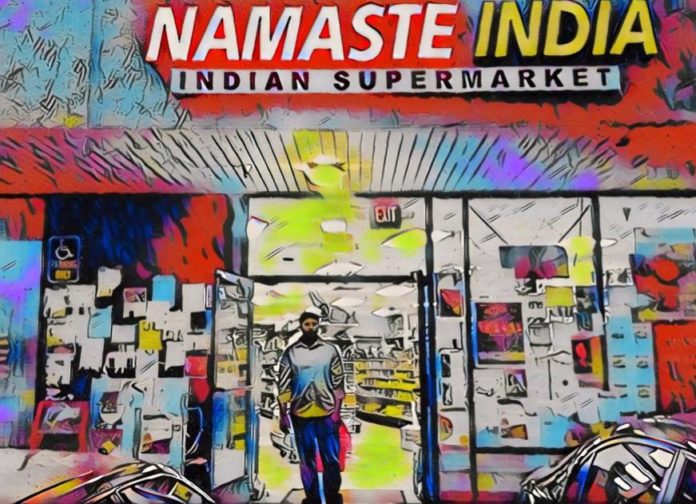As part of The Occidental’s COVID-19 coverage, we are running a series titled “Letters from” written by staff writers, editors and Occidental students. These letters aim to document the experience and insights of Occidental students as they adjust to new circumstances.
In the 15 years I’ve lived in the United States, I’ve moved twice but never lived more than a mile away from Namaste India. A small, objectively dingy neighborhood grocery store situated next to my old elementary school, Namaste India is where you inevitably run into a half-dozen acquaintances and friends per visit, where you walk or drive in your pajamas to buy coriander leaves or buttermilk on a lazy Sunday morning. The outer wall is a pane of glass layered with the sticky residue of bits of tape holding up a plethora of signs, from garage sale posters — “All ten Vishnu avatar idols for just $8.99!” — to the ubiquitous test-prep ads — “Get your ACT together!” It’s the picture of quotidian suburbia, it’s unromantic and it’s home.
The day before Alameda County became among the first in the nation to institute mandatory stay-at-home orders, I made a mad dash for Namaste India. The checkout line wrapped around the perimeter; people’s carts were teeming and a low, worried buzz of multilingual chatter persisted throughout the store. The shelves, usually a lawless array heaping with random bags and tins, were nearly empty. The store clerk wore a mask and gloves, wordlessly working through the piles of groceries; aunties greeted each other without the usual touch of exuberance. Although fuller than I had ever seen it, my prosaic childhood stomping ground had taken on an eerie, apocalyptic hum.
Fremont was once an industrial powerhouse, but in the last decade has transformed into a hub for tech workers and their families. This is a city of immigrants and their children. There is a high percentage of Asian and Latinx residents, and my old high school is adjacent to Little Kabul, home to the most Afghani people outside of Afghanistan. My family and many others, including Tamil, Bengali and Punjabi people, celebrated the Solar Calendar New Year April 14. Many of my friends began observing Ramadan April 23. While these holidays and celebrations are outward expressions of our distinct cultures, the coronavirus pandemic has illuminated a more ingrained similarity.
In her book “Rule Makers, Rule Breakers,” psychologist Michele Gelfand draws a distinction between what she calls “tight” and “loose” cultures. While loose cultures tend to be permissive, valuing creativity and individuality, tight cultures tend to emphasize collective and familial well-being. They have strong norms and little patience for those who endanger them. Many immigrants in my area come from tight cultures.
My parents, like many Indian adults, left their middle-class lives in India to pursue higher education. My close friend left Pakistan as a child to escape religious and sexual violence in her community. Dozens of my high school classmates and their families entered the United States crammed in the trunk of a van, cloaked in darkness and breathing in silence to escape detection at the border. Whether it was for higher education or for basic safety, whether they were born to immigrants in this country or were immigrants themselves, the people of my city have lives defined by flight. Cultures like these are tight by definition; putting family members before themselves, valuing ritual and tradition and caring for others in their communities is what allows many immigrants to undergo these hardships without breaking.
It is this sense of communion that is keeping me safe, physically and emotionally, during the pandemic. It is rare to see anybody outside, even for a walk, and those who do go outside always wear masks and move six feet away when they see me coming. Our neighbor gave us a handful of homemade masks that her family sent her from Vietnam. My whole neighborhood has rallied together to provide food for elderly residents, and last week someone called the parents of a gaggle of teenagers gathered in the park in order to stop their loitering. A tight culture can be stifling, but it is a source of love and connection.
Back in line at Namaste India, since I was clearly in it for the long haul, I decided to make the most of the wait. I ripped open a kulfi pop — eating before paying is strictly prohibited by the owner, and that’s most of the appeal — and let the words and sounds overtake me. I lost track of how many languages I could hear. A mother told her teenage son, in Tamil, to get a package of filter coffee, and he replied, in English, “Small bag or large?” A girl, wearing a blue frock and a long column of tiny braids, debated with her father which Malayalam movie to rent. I was unable to resist chiming in. “Take Drishyam. You can’t go wrong.”
Looking back a month later and after the shelter-in-place mandate, I know that crowding so many people into a tiny store was a bad idea. I haven’t been back since, and neither have most people I know. But I’m not afraid. I’m always going to be part of this strange, comforting mash of people claiming something as our own. They taught me what safe feels like, and they will be there when we all return.
![]()




































